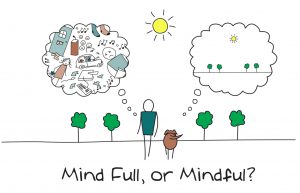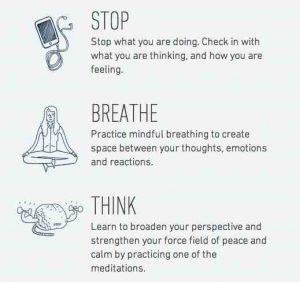Defining Mindfulness
What exactly is mindfulness? The simplest definition is “clear awareness.” It’s the ability to be present, consciously knowing what’s happening in your experience, moment by moment. You can apply that attention to your mind, body, or environment. Mindfulness is a state of mind and a quality that you can develop through practice. Although we all have access to this quality, it takes patience and perseverance for it to become part of the fabric of who you are.
How Present Are You?
You may think that you are already aware of what’s going on moment to moment in your life. That’s true on one level. But if you take a closer look, you will see there are many times in the day when you’re not fully present in the moment. Your mind drifts to other topics. Or you ignore things that are ‘extra’ to the information your mind is processing.
Take an ordinary activity like driving. How many times have you driven the same route? If someone asks you how many houses are on one block, you won’t be able to remember. Memory partly depends on attention, and if you are not mindful, not conscious of driving past houses, (what is happening as it is happening), then you’re probably on autopilot. This is one of the reasons we don’t remember much.
The Multitasking Brain
Autopilot is what happens when you’ve done something, like walk, drive, or do the dishes, so many times you don’t need to focus on it anymore. It almost does itself. So, as you’re doing that activity, you start to space out or think about things like your to-do list or the top ten tunes. Or you think about what to cook for dinner or the problems in your relationship. Whatever it is, your attention is not on what you’re doing. It’s elsewhere.
This divided focus has been referred to as “constant partial attention.” It is your multitasking brain, which allows you to do more than one thing at a time. Often your brain does this to get through all the demands of your busy day. The result is that you are not very present in the moment. That is the opposite of being mindful.
Inattention to the moment can be dangerous. Texting while driving causes 330,000 injuries every year. Cell phone use while driving leads to 1.6 million crashes each year.
Multitasking Dosen’t Help You
Multitasking doesn’t help you get more done or be more efficient. Research shows that multitasking on the job diminishes both your efficiency and the quality of your work. Even worse, multitasking releases the stress hormones cortisol and adrenaline, which can lead to all kinds of health problems.
A large study conducted by Harvard Medical School turned up some surprising results about the effects of not paying attention. Researchers asked people in the study three questions as they went about their day: “What are you doing?” “Are you paying attention to it?” “How do you feel?” They tracked several thousand people over a period of weeks, checking in on them by phone throughout the day and asking them those three questions.
They discovered that, on average, participants were not present 46.9 percent of the day. If you sleep roughly a third of the day and are only present half of your waking hours, then by the time you are sixty, you’ve only been awake and present for twenty years! That’s a lot of time lost.
You’re Happier When You Pay Attention
What was perhaps more important in the findings was that people reported feeling happier when they were present, even if the activity was a mundane chore like laundry, washing dishes, or ironing. The study revealed that, again contrary to popular belief, people are not happier when they space out or daydream during a dull activity. So next time you are cleaning the house, walking the dog, or taking a long drive in your car, give it your full attention and see for yourself what happens.
*original article by Mark Coleman
* Click here to find out more about Terezia Farkas and Depression Help


